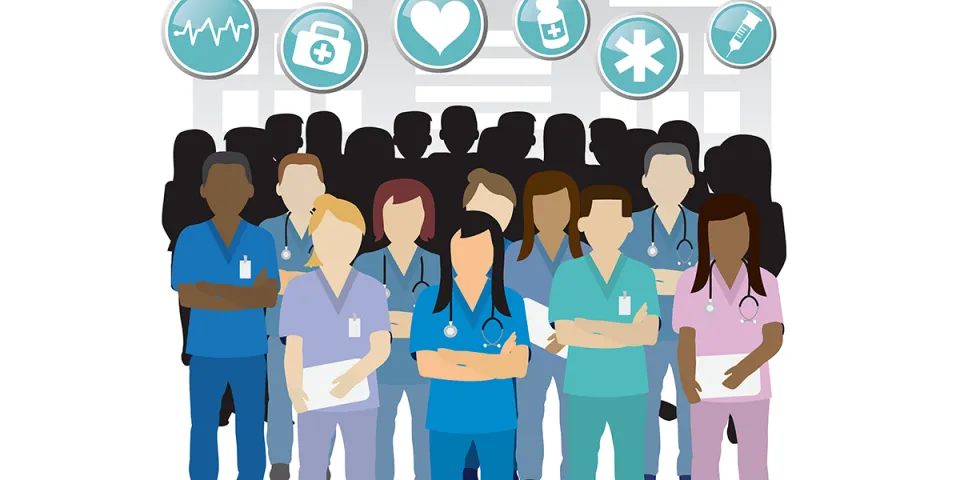Latest
How Hard is Nursing School?
Apr 17, 2019

Wondering if you have what it takes to be a nurse? You’re probably not alone. Many aspiring nurses experience doubts about their ability to finish nursing school, imagining frequent all-nighters, endless hospital shifts, strict instructors and grueling exams.
In reality, nursing school doesn’t live up to these negative stories. Sure, becoming a nurse has its challenges, but that shouldn’t discourage you from pursuing a career you love.
To dispel some of the rumors you might have heard, we asked our recent nursing graduates to tell us about what nursing school is really like. Check it out!
Is it hard to get into nursing school?
For some schools, nursing program prerequisites can be tough. The key is to find the right school that is geared toward helping you get on the right path to your nursing career. Often, you can earn credit for your prior work or college experience, allowing you to earn your degree faster.
“I was able to get credit for classes that I had taken elsewhere and for my prior experience as an LPN,” says Herzing BSN graduate Katrina Games. “That made it possible for me to start working toward my BSN right away.”
How long is nursing school?
There are a variety of pathways you can take to a nursing career. Some students prefer to start out in an associate degree (ASN) program, which can be completed in as little as 20 months. If you want to get started in your nursing career even faster, you can earn your diploma in practical nursing (DPN) in as little as 12 months.
More and more nursing students are opting to earn their bachelor’s degree (BSN) in order to position themselves for career advancement and differentiate themselves from others in the nursing workforce. Typically, students can earn their BSN in as little as three years. However, if you are already a registered nurse with your ASN, you can earn your BSN in as little as 12 months through an accelerated RN to BSN program.
How hard will my classes be?
Your nursing coursework is meant to be challenging, but not impossible. When asked about how to succeed in nursing school, many Herzing graduates emphasize the importance of asking for help when you need it and taking advantage of additional academic resources, such as the Writing Center.
“The nursing program was hard, but fair,” says Herzing BSN graduate Latasha Carr. “Embrace what you love and know that a nursing program should never be designed to be easy, especially when we have people’s lives in our hands. If nursing is something you want to do, then you must give it your all!”
It’s also important to remember that your instructors are there to help you succeed. They are happy to make themselves available to meet with you and answer any questions you might have – all you have to do is ask!
What is clinical like?
Your clinical experiences will help you apply theory to practice and develop valuable leadership, critical thinking and problem-solving skills. While you might be nervous about working with real patients for the first time, remember that this is a learning process every new nurse must go through.
If you make the most of your clinical experience, you’ll be well-prepared for your future nursing career. Sometimes, your clinical experience can even shape the kind of nurse you aspire to become.
“All of my clinical experiences in the BSN program were extremely valuable, says Brandon Charles Shaver, a recent BSN graduate at Herzing-Kenosha “My final clinical rotation at an intensive treatment program for autistic and intellectually disabled patients had the greatest impact on me. I didn’t know I would fall in love with that community and now I feel even more passionate about pursuing a career in nursing. “
Can I balance nursing school with my current job?
You absolutely can. You’ll want to find a school that is focused on adult learners, one that can provide you with the support and flexibility you need to balance your degree with your career. Schools that offer small class sizes and a mix of online and on-campus course options can make it easier for you to earn your degree on your own time, in a way that works for you.
“Being able to earn my bachelor's degree while working as a registered nurse was a huge advantage, as was the fact that many of my courses were online,” says Lindsay Van Galder who completed Herzing’s RN to BSN program. “It was a challenge managing a full-time job and new courses every eight weeks, but the classes were set up nicely, allowing me enough time to complete my assignments and projects,” she adds.
Is nursing school worth it?
While everyone’s journey to a nursing career is different, all of our nursing graduates agree that hard work pays off in the end. Nursing school is challenging for a reason, and that is to help you become the best nurse you can be.
“Everything I went through made me realize that anything is possible. You just have to find your own way because the same process or path doesn’t work for everyone,” says Sharese Windley, who earned her BSN nearly 10 years after she first began nursing school.
Shaver agrees: “My advice for other students is to keep going, no matter what obstacles present themselves along the way. It doesn’t matter if it takes 2 years or 20 – follow your dreams.”
You won’t regret it!
Learn More About Our Online BSN program
BLS pay estimates calculate the median annual wage for various occupations. Per the BLS the median wage for an occupation is: "The wage at which half of the workers in the occupation earned more than that amount, and half earned less. Median wage data are from the BLS Occupational Employment and Wage Statistics survey." Bureau of Labor Statistics (BLS), U.S. Department of Labor, Occupational Outlook Handbook 2024. BLS median wage estimates do not represent entry-level wages and/or salaries. Multiple factors, including prior experience, age, geographic market in which you want to work, and degree level and field, will affect career outcomes, including starting salary and earnings as an experienced employee. Herzing neither represents that its graduates will earn the median salaries calculated by BLS for a particular job nor guarantees that graduation from its program will result in a job, promotion, particular wage or salary, or other career growth.
Latest
Recent Blog Posts
Subscribe to our Newsletter
Get the latest news you need to know, from study hacks to interview tips to career advancement. Have it delivered right to your inbox biweekly.








